According to the original inscription, my copy of Curfew Must Not Ring To-night, by Rose Hartwick Thorpe, dates from before 1896. It was given as a present to my grandmother from her mother in March 1912, and along with her copy of Hans Andersen’s Fairy Tales it provided some of the outlines for my earliest literary ‘mental maps’.
England’s sun was slowly setting oe’r the hills so far away,
Filling all the land with beauty at the close of one sad day;
And its last rays kissed the faces of a man and maiden fair,–
He with step so slow and feeble; she with sunny, floating hair;
He with bowed head, sad and thoughtful, she with lips so cold and white,
Firmly set to hush the murmur, “Curfew must not ring to-night.”
“Sexton,” Bessie’s white lips faltered, pointing to the prison old,
With its walls so grey and dismal,– walls so dark and damp and cold,–
“I’ve a lover in that prison, doomed this very night to die
At the ringing of the Curfew, and no earthly help is nigh.
Cromwell will not come till sunset;” and her face grew strangely white
As she spoke in husky whispers, “Curfew must not ring to-night.”
“Bessie,” calmly spoke the sexton — every word pierced her young heart
Like a fatal, gleaming arrow, like a deadly poisoned dart,–
“Long, long years I’ve rung the Curfew from that gloomy shadowed tower;
“Every evening, just at sunset, it has told the twilight hour:
“I have done my duty ever, tried to do it just and right;
“Now I’m old, I will not miss it: Girl, the Curfew rings to-night!”
Wild her eyes and pale her features, stern and white her thoughtful brow,
And within her heart’s deep centre, Bessie made a solemn vow,
She had listened while the judges read, without a tear or sigh,
“At the ringing of the Curfew, Basil Underwood must die.”
And her breath came fast and faster, and her eyes grew large and bright–
One low murmur, scarcely uttered,– “Curfew must not ring to-night.”
She with light step bounded forward, sprang within the old church door,
Left the old man coming slowly, paths he’d trod so oft before;
Not one moment paused the maiden, but with cheek and brow aglow,
Staggered up the tower so gloomy, where the bell swung to and fro:
Then she climbed the slimy ladder, dark, without a ray of light,
Upward still, her pale lips saying,– “Curfew shall not ring to-night”
She has reached the topmost ladder, o’er her hangs the great dark bell;
Awful seems the gloom beneath her, like the pathway down to hell;
See the ponderous tongue is swinging,– ’tis the hour of Curfew now,
And the sight has chilled her bosom, stopped her breath, and paled her brow.
Shall she let it ring? No, never! Flash her eyes with sudden light,
As she springs, and grasps it firmly, “Curfew shall not ring to-night!”
Out she swung,– far out. The city seemed a tiny speck below;
There, twixt heaven and earth suspended, as the bell swung to and fro;
And the half-deaf Sexton ringing (never now he heard the bell!)
Sadly thought the twilight Curfew rang young Basil’s funeral knell;
Still the maiden, clinging firmly, cheek and brow so pale and white,
Stilled her frightened heart’s wild beating, “Curfew shall not ring tonight.”
It was o’er; the bell ceased swaying, and the maiden stepped once more
Firmly on the damp old ladder, where, for hundred years before,
Human foot had not been planted,– dreamt not that the brave deed done
Should be told long ages after; yet, while rays of setting sun
Light the sky with mellow beauty, aged sires, with heads of white
Tell the children why the Curfew did not ring that one sad night.
O’er the distant hills came Cromwell; Bessie saw him; and her brow,
Lately white with care and anguish, glows with sudden beauty now,
At his feet she told her story, showed her hands, all bruised and torn;
And her sweet young face, still wearing traces of the anguish borne,
Touched his heart with sudden pity, lit his eyes with misty light.
“Go! your lover lives,” cried Cromwell. “Curfew shall not ring to-night.”
* * * * *
While writing this piece I’ve discovered a final verse which isn’t included in my edition, but I think the poem works better without it:
Wide they flung the massive portals, led the prisoner forth to die,
All his bright young life before him. Neath the darkening English sky,
Bessie came, with flying footsteps, eyes aglow with lovelight sweet;
Kneeling on the turf beside him, laid his pardon at his feet.
In his brave, strong arms he clasped her, kissed the face upturned and white,
Whispered, “Darling, you have saved me, curfew will not ring to-night.”
* * * * *
ROSE HARTWICK THORPE AND THE STORY OF ‘CURFEW SHALL NOT RING TO-NIGHT’
I began my research into the history of the poem after dipping into Folklore, Myths and Legends of Britain (Reader’s Digest Association, 1973), where I came across a much earlier version of the Curfew story than the one I grew up with:
During the Wars of the Roses, a nephew of the Earl of Warwick was captured by the Yorkists and condemned to die at Chertsey, Surrey, within 24 hours; the signal for his execution was to be the tolling of the curfew bell in St Peter’s Church. A messenger was sent to the king for a pardon, but when the time came for the bell to ring, he still had a mile to ride. As if by a miracle, the bell did not ring that night and the condemned man’s life was saved. It turned out that his sweetheart, Blanche Heriot, had climbed into the belfry and hung on the great bell’s clapper until he was reprieved. This exploit became a favourite theme of later storytellers, and in America it inspired the well-known ballad:
‘As you swing to the left,
And you swing to the right,
Remember the curfew
Must never ring tonight.’
In this version the story is set in 1471 rather than in the 17th century, and an internet search suggests that the legend of Blanche Heriot was first brought to a wider public in two works by the Chertsey-born Victorian writer Albert Smith (1816 – 1860). His play, Blanche Heriot, or the Chertsey Curfew, was produced in 1842, and in 1843 his short story on the same subject, “Blanche Heriot: A Legend of Old Chertsey Church” was published in The Wassail-Bowl: A Comic Christmas Sketchbook, Volume II. In 1865 an article by Lydia Sigourney (1791 – 1895), “Love and Loyalty”, appeared in the American publication, ‘Peterson’s Magazine’, and this seems to have provided inspiration for a further version by another American writer, Rose Hartwick Thorpe (1850 – 1939).
The Open Library website has an online version of George Wharton James’s 55-page book Rose Hartwick Thorpe and the story of Curfew Must Not Ring To-night, first published in 1916, which provides lots more fascinating detail, including the fact that Rose’s family could trace their ancestry back to Old King Cole and that ‘one of the treasured possessions of the family to this day is the Coat of Arms of the Coles, which clearly indicates the kingly descent claimed’. Rose was only 16 when she wrote Curfew, in 1867, and she went on to publisha number of further works, including Remember The Alamo. Her poems were collected and published in the 1880s as Ringing ballads, including Curfew must not ring tonight.
The poem, a favorite of Queen Victoria’s, was one of the most popular of the 19th century. It was set to music in 1895, by Stanley Hawley and published as sheet music by Robert Cooks and Co. As a child I learned to sing the chorus of one of the comic versions, ‘Hang on the Bell, Nellie’, but until now I didn’t know any verses – the internet is an endless source of entertainment. Apparently it was recorded by Billy Cotton of ‘Billy Cotton’s Bandshow’ fame – see Links at the bottom of the page.
* * * * *
“The Chertsey Curfew” (below), a poem written sometime in the later part of the 19th century by Boyd Montgomerie Ranking, is a less successful attempt to cover the same theme. I haven’t been able to find out much about Montgomerie Ranking but he’s described as a journalist and a writer of ‘valentines and poetry’. He was apparently based in London, and between September 1881 and December 1884 he was first proprietor and then editor of the magazine ‘Time – a monthly miscellany of interesting and amusing literature’. The magazine’s fortunes slumped under his charge and he was dismissed by a subsequent owner on the grounds that he was attracting an inferior class of writer. However, I also found a mention of him in a William Butler Yeats chronology (23 June 1887: ‘Calls on the journalist Boyd Montgomerie Ranking’), so either Yeats, twenty-two years old and newly returned to London, was working hard to get published and not too fussy about who he dealt with, or the definition of ‘inferior class of writer’ has shifted a bit since then.
* * * * *
The Chertsey Curfew
by Boyd Montgomerie Ranking
It is the autumn of the year,
The woods are turning brown,
The Lammas rains have swelled the weir,
The sun is sinking down,
All things seem calm and quiet here
In pleasant Chertsey town.
All nature seems serene and fair,
As sunset gleams are shed,
In gold across the churchyard, where
There sleep the quiet dead;
But a woman is climbing the belfry stair
With a swift and silent tread.
Up and up the winding stair
And now at last she stands–
A set look on her face so fair.
With tight-clenched writhing hands–
Within the belfry dim and bare
And eyes the tight rope’s strands.
It seems the goal she sought is found,
Her bosom ‘gins to swell;
Then, as she stands and looks around,
To the great curfew-bell
She mutters, “Thou shall never sound
To toll my Martin’s knell!”
For the bitter Puritans have sworn
At curfew chime that day
Young Martin’s life-thread shall be shorn
Because he dared to pray
As his fathers prayed ere he was born,
In the old accustomed way.
And Blanche has prayed with sobs and tears
The sexton, deaf and old,
That now first in so many years
That bell may not be tolled;
But he only answers, as half he hears,
“My hand I shall not hold!”
“Through all my life, in peace or strife,
I’ve set that bell a-swing;
The neighbours round expect its sound,
Relief from toil to bring;
Have done, I say! no use to pray,
The curfew-bell must ring!”
Then with a set and steadfast face
She got her up the tower;
And now within that dismal place
She waits the fated hour,
A-gazing on the hollow bass
That hath such deadly power.
The rope grows tight through all its strands,
And with a sudden bound
She has leapt aloft, and the small white hands
The cruel tongue around
Are clasped :-the sexton tolling stands,
Now too and fro the clapper swings
Her hands are bruised and bleeding
But still with close-shut eyes she clings,
Her agony unheeding;–
Never a note of curfew rings,
And the minutes fast are speeding.
The deed is done, her end is won,
The bell stays in mid-air;
With a strange smile she stands awhile,
As past were all her care,
Nor pain she heeds ;-anon, she speeds
Adown the belfry stair.
A stern, grim man with a piercing eye
With his troop rides past amain,
And “Cromwell! Cromwell !” is the cry,-
Then up she springs, so fain
To stay his course as he passes by,
And grips at his bridle-rein.
The steed is stayed, her tale is told;
Soft grows that rugged face,
And something clouds the eye so cold
As he speaks the word of grace,
And Martin loosed from bonds and hold
Stoops to his love’s embrace.
And still as at the evening hour,
With slow and solemn knell,
The curfew tolls from Chertsey tower,
Its ringing seems to tell
Of brave Blanche Heriot, and the power
Of love that nought can quell.
* * * * *
HANG ON THE BELL, NELLIE
Words and Music by : T. Connor, C. Erard, R. Parker
The scene was in the jailhouse, and if curfew rang that night
The guy in number 13 cell would go out like a light.
She knew her Dad was innocent, so plucky Little Nell
Has tied her tender torso to the clapper on the bell.
Oh, hang on the bell, Nelly, hang on the bell
Your poor Daddy’s locked in a cold jailhouse cell.
As you swing to the left, Nelly swing to the right
Remember the curfew bell must never ring tonight.
It all started when Nelly said, “No! No! No!” to Handsome Jack
And struggled as he tried to kiss her down by the railroad track;
Nell’s Dad rushed up to save her as the train came down the line,
And Jack fell back across the track and paid the price of crime.
Oh, hang on the bell, Nelly, hang on the bell
Your poor Daddy’s locked in a cold jailhouse cell.
As you swing to the left, Nelly swing to the right
Remember the curfew bell must never ring tonight.
Nell’s Dad he got arrested, and brought up before the Law,
The Policeman said, “Old Handsome Jack ain’t handsome any more!”
Nelly cried and pleaded, but the jury did not care —
They didn’t have a sofa, so they offered him the chair.
Oh, hang on the bell, Nelly, hang on the bell
Your poor Daddy’s locked in a cold jailhouse cell.
As you swing to the left, Nelly swing to the right
Remember the curfew bell must never ring tonight.
They pulled on the bell rope, but there was no ting-a-ling
They could not get their business done, for curfew would not ring!
To and fro aloft swung Nelly, as below they pulled and heaved,
When suddenly a voice cried “Stop! Your daddy’s been reprieved!”
Oh, hang on the bell, Nelly, hang on the bell
Your poor Daddy’s locked in a cold jailhouse cell.
As you swing to the left, Nelly swing to the right
Remember the curfew bell must never ring tonight.
* * * * *
Photos © Angela Williams, 2008
LINKS
– Wikipedia: Blanche Heriot by Albert Smith.
– The story of the Chertsey Curfew Bell.
– ‘The Chertsey Curfew’: a copy of the poem by Montgomerie Ranking.
– Rose Hartwick Thorpe and the story of Curfew Must Not Ring To-night at The Open Library.
– ‘Hang on the Bell, Nellie’ performed by Billy Cotton, on YouTube.
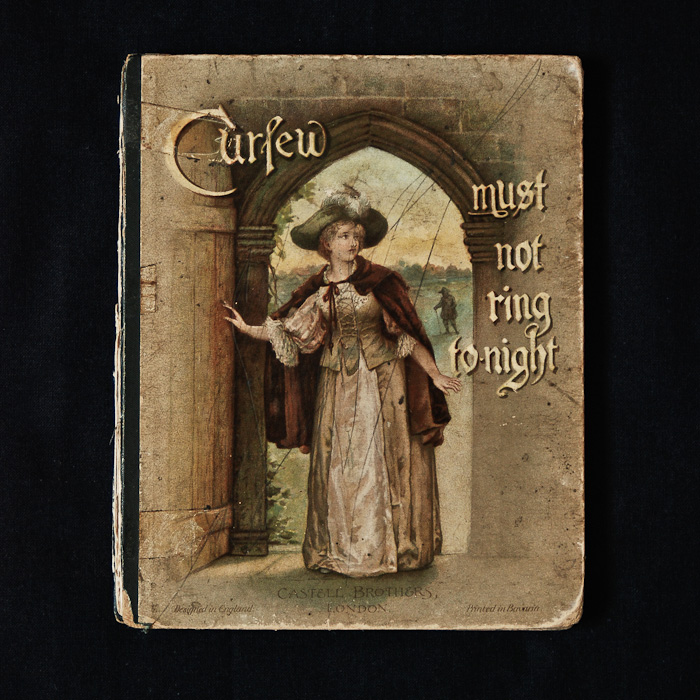
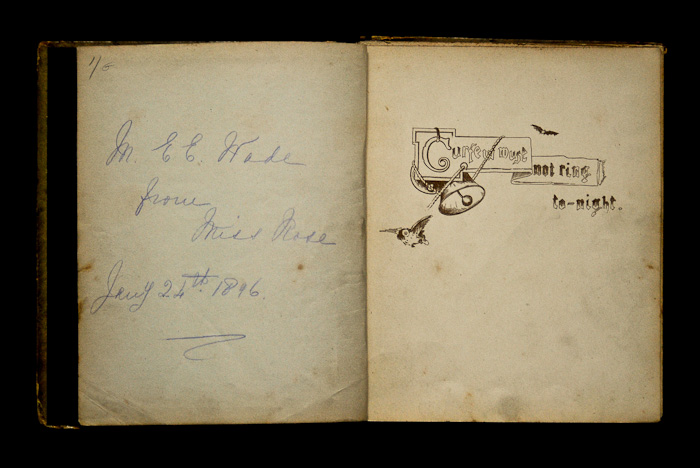
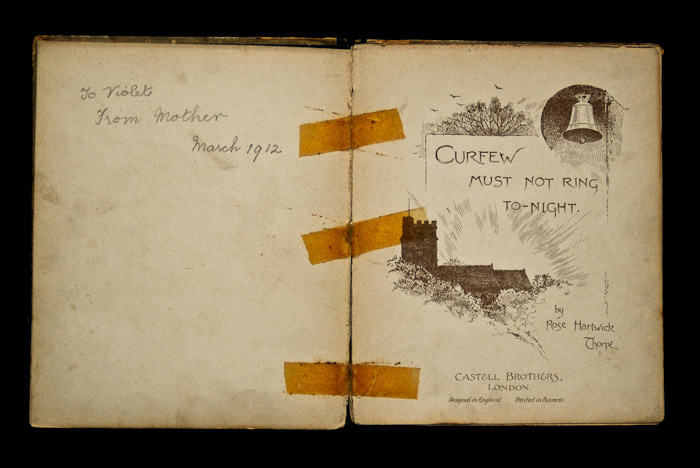
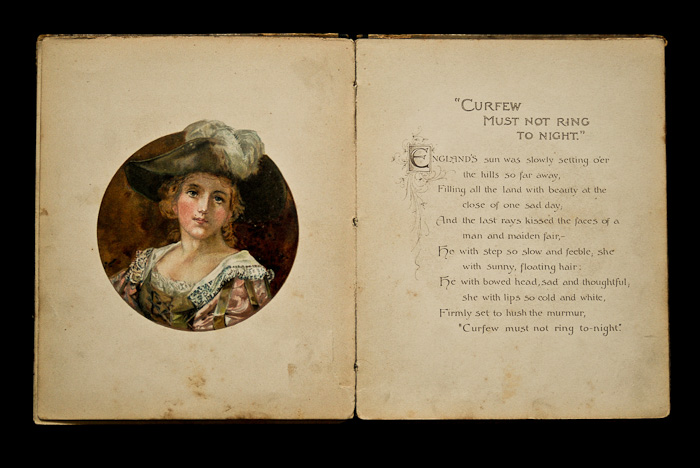
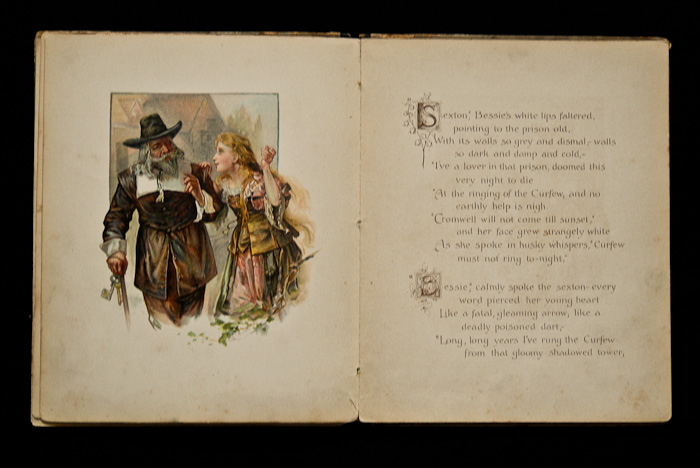
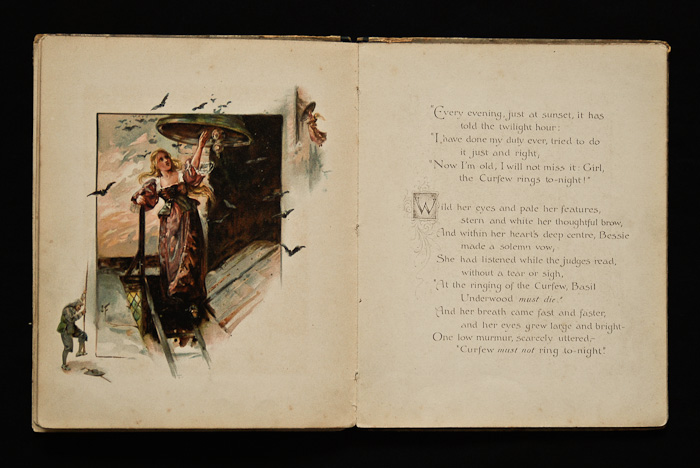
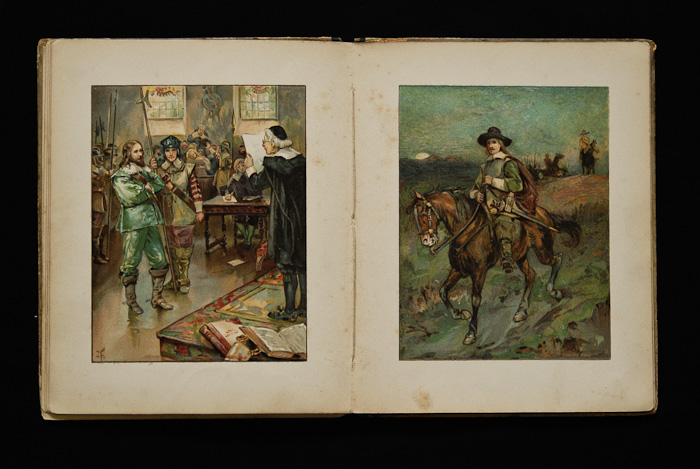
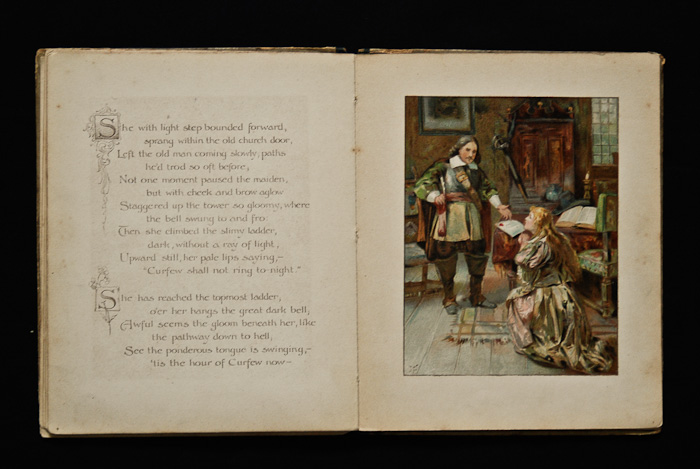
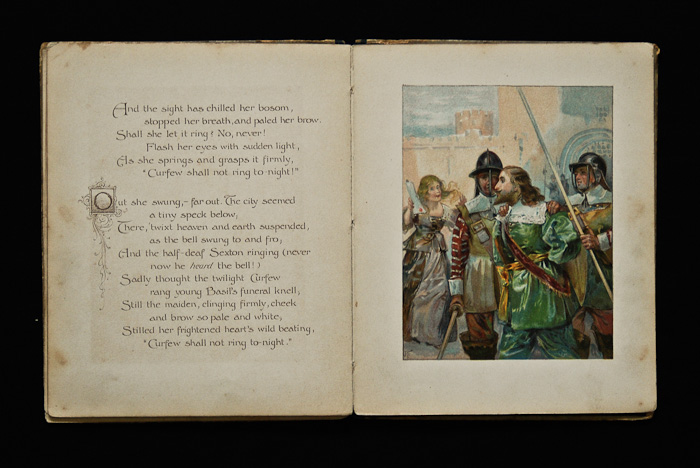
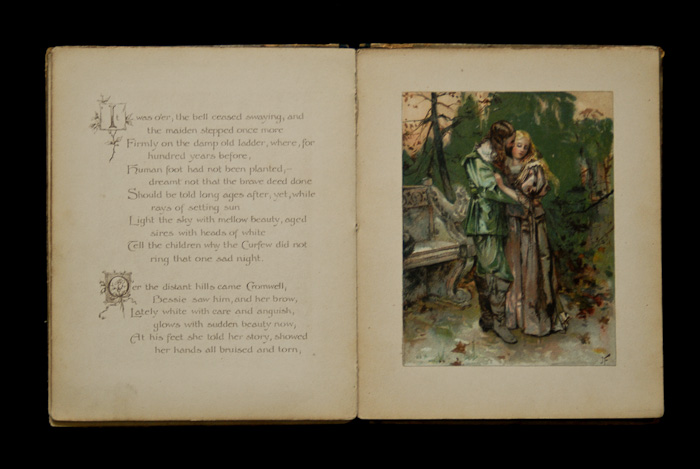
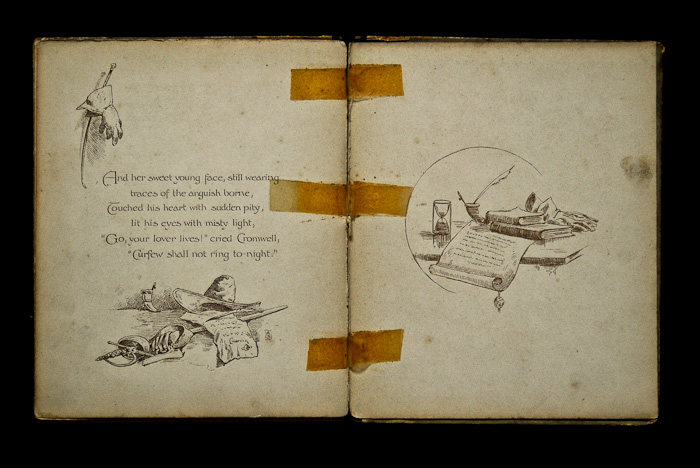
Comments
2 responses to “Curfew must not ring to-night”
When I was a child (I am 85 now) I remember my mother reciting the poem “Curfew Must Not Ring Tonight.” She had to memorize it in school. She could still recite it years later, word for word. I was gratified to find it on the computer as it brings back such pleasant memories for me when I read it. I recently received a knee replacement and anticipate being in (my home) a lot this winter because of the snow and ice. I think I will memorize it and make sure my children, grandchildren and great grandchildren hear me recite it at least once.
[…] One, “Curfew Must not Ring To-night,” was a dramatic and memorably romantic poem written in 1867, set in the 17th century by its 16 year-old author, Rose Hartwick Thorpe. The fanciful story — one of a number of retellings — concerns a young woman who risks her life to stop the parish church bell from ringing the evening curfew. Her lover has been — unjustly, of course — sentenced to die when the curfew bell tolls. You can read it at this link. […]